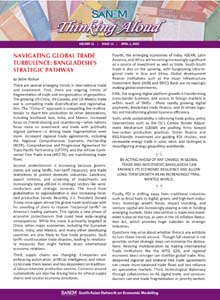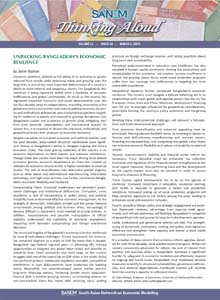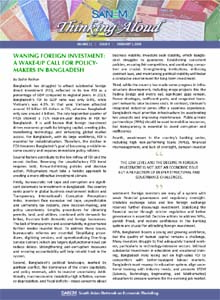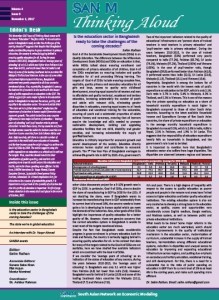
Thinking Aloud: Volume IV, Issue 6
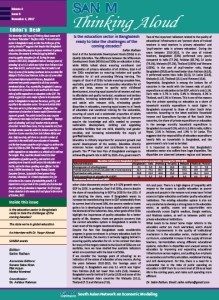 This November 2017 issue of Thinking Aloud comes with the theme “Education”. The first article “Is the education sector in Bangladesh ready to take the challenges of the coming decades?” suggests that despite that Bangladesh made considerable progress in gross-enrolment in primary education, the country is seriously lagging behind in ensuring quality education for all. During the years between 2010-2015, Bangladesh had an ‘average years of schooling’ of only 5.1 which was higher than Pakistan’s but lower than India’s, and much lower than Sri Lanka’s and those of some of the leading Southeast Asian countries like Malaysia Thailand and Vietnam. In the case of some other educational infrastructural indicators, Bangladesh performed very poorly compared to all these countries mentioned above. Also, regrettably, Bangladesh is among the bottom list of countries in the world with the lowest ratio of public expenditure on education to the GDP. The article suggests for some major reforms in the education sector in Bangladesh to improve the access, quality, and equality in the education sector. The second article titled “The state we’re in global education” emphasizes the importance of education in human capital formation and economic growth. The article looked into cross-country differences in two major indicators of education – ‘average years of schooling’ and ‘pupil-teacher ratio in primary education’. In both these cases, the top countries are from the high-income countries while the bottom countries are from low-income countries from Sub-Saharan Africa and Asia. Unfortunately, still there is a sizeable number of countries in the world with poor educational outcomes, and the low-income countries might struggle to achieve the Goal 4 of SDGs by 2030. The article suggests using the public expenditure on education as a critical tool to achieve the targets. Thus, countries should reevaluate their prioritization of public spending, and reorient such spending more towards social sectors like education and health, and make these spending more efficient. In this issue, SANEM interviews Dr. Vaqar Ahmed, Deputy Executive Director, Sustainable Development Policy Institute, Islamabad. Dr. Ahmed emphasizes that, for education to be a source of productivity growth, it is important to not just look at the quantity of education but also the quality of education is important. The final page draws attention to the events that took place in the month of October.
This November 2017 issue of Thinking Aloud comes with the theme “Education”. The first article “Is the education sector in Bangladesh ready to take the challenges of the coming decades?” suggests that despite that Bangladesh made considerable progress in gross-enrolment in primary education, the country is seriously lagging behind in ensuring quality education for all. During the years between 2010-2015, Bangladesh had an ‘average years of schooling’ of only 5.1 which was higher than Pakistan’s but lower than India’s, and much lower than Sri Lanka’s and those of some of the leading Southeast Asian countries like Malaysia Thailand and Vietnam. In the case of some other educational infrastructural indicators, Bangladesh performed very poorly compared to all these countries mentioned above. Also, regrettably, Bangladesh is among the bottom list of countries in the world with the lowest ratio of public expenditure on education to the GDP. The article suggests for some major reforms in the education sector in Bangladesh to improve the access, quality, and equality in the education sector. The second article titled “The state we’re in global education” emphasizes the importance of education in human capital formation and economic growth. The article looked into cross-country differences in two major indicators of education – ‘average years of schooling’ and ‘pupil-teacher ratio in primary education’. In both these cases, the top countries are from the high-income countries while the bottom countries are from low-income countries from Sub-Saharan Africa and Asia. Unfortunately, still there is a sizeable number of countries in the world with poor educational outcomes, and the low-income countries might struggle to achieve the Goal 4 of SDGs by 2030. The article suggests using the public expenditure on education as a critical tool to achieve the targets. Thus, countries should reevaluate their prioritization of public spending, and reorient such spending more towards social sectors like education and health, and make these spending more efficient. In this issue, SANEM interviews Dr. Vaqar Ahmed, Deputy Executive Director, Sustainable Development Policy Institute, Islamabad. Dr. Ahmed emphasizes that, for education to be a source of productivity growth, it is important to not just look at the quantity of education but also the quality of education is important. The final page draws attention to the events that took place in the month of October.
Tag: Education, pupil-teacher ratio, public expenditure on education

